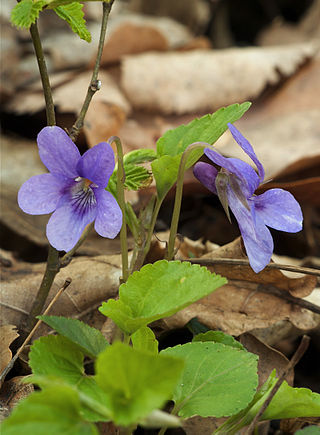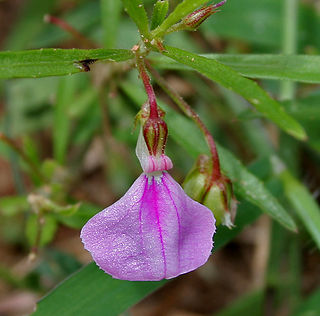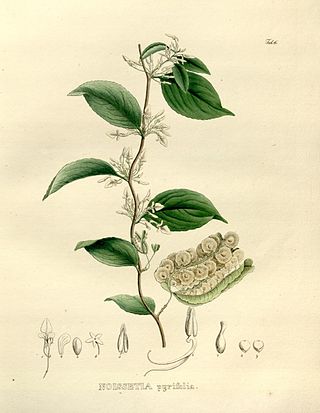
Viola is a genus of flowering plants in the violet family Violaceae. It is the largest genus in the family, containing over 680 species. Most species are found in the temperate Northern Hemisphere; however, some are also found in widely divergent areas such as Hawaii, Australasia, and the Andes.

Violaceae is a family of flowering plants established in 1802, consisting of about 1000 species in about 25 genera. It takes its name from the genus Viola, the violets and pansies.

Wahlert Catholic High School is a private Roman Catholic high school in Dubuque, Iowa, United States, in the Roman Catholic Archdiocese of Dubuque.

Dicoma is a genus of flowering plants in the family Asteraceae, native to Africa and the Middle East.

Rinorea is a genus of flowering plants in family Violaceae. It includes 212 species native to the subtropics and tropics.
Bribria crenata is a species of flowering plant in the Violaceae family. It is found in Costa Rica and Panama.
Bribria oraria is a species of flowering plant in the Violaceae family. It is a tree endemic to northern Venezuela.
Ixchelia uxpanapana is a species of plant in the family Violaceae. It is endemic to Mexico, and is native to the states of Oaxaca and Veracruz.

Hybanthus (green-violet) is a genus of flowering plants in the family Violaceae. This genus name is Greek for "humpback flower", referring to the drooping pedicels of plants that are part of this genus. The genus is grossly polyphyletic and may contain up to nine different genera, of which Pombalia Vand., Cubelium Raf. and Pigea DC. have been previously recognised.

Lepironia is a genus of the sedge family, comprising only one species, Lepironia articulata, known as the grey sedge. It is found in Madagascar, India, Sri Lanka, southern China, Southeast Asia, New Guinea, and various islands of the western Pacific. It also occurs in northern and eastern Australia, as far south as Thirlmere Lakes National Park in New South Wales.
Ischnolepis is a species of plants in the family Apocynaceae first described as a genus in 1909.

Isodendrion is a plant genus in the family Violaceae. It includes four species native to the Hawaiian Islands.

Schweiggeria is a genus of flowering plants in the violet family Violaceae, with one or two species, found in eastern Brazil.

Noisettia is a genus of flowering plants in the violet family Violaceae, with a single known species.

Calyptrion is a genus of flowering plants in the violet family Violaceae, with four known species.

Agatea is a genus of flowering plants in the violet family Violaceae, with seven accepted species, found in New Guinea and New Caledonia.

Anchietea is a genus of flowering plants in the violet family Violaceae, with six accepted species, found in tropical South America.
Hybanthopsis is a genus of flowering plants in the violet family Violaceae, with a single accepted species, found in north-east Brazil.
Hawkesiophyton is a genus of flowering plants belonging to the family Solanaceae. It is also in Solanoideae subfamily, Tribe Solandreae Miers and also Subtribe Juanulloinae.
Ixchelia is a genus of flowering plants in the violet family, Violaceae. It includes three species native to Mexico and Central America.












